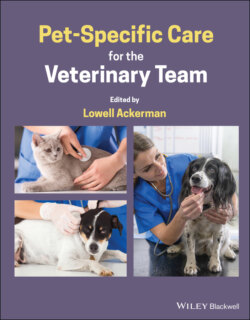Читать книгу Pet-Specific Care for the Veterinary Team - Группа авторов - Страница 304
3.8.3 On a Client Acquiring a New Pet
ОглавлениеIf a client asks about adopting or purchasing a new dog or cat, the hospital team can discuss breed or mixed‐breed anatomical and behavioral expectations and whether they fit with the client's lifestyle and home environment (see 3.10 Advising Clients on Selecting an Appropriate Pet). Terrier and terrier‐type dogs have very different behavioral characteristics from retrievers or shepherds. Long‐haired versus short‐haired cats and dogs have different grooming requirements.
If the client is purchasing a purebred dog or pedigreed cat, there are breed‐specific prebreeding health screening recommendations for the parents. For dogs, these can be found at the OFA Canine Health Information Center (www.ofa.org/breedtests.html). Common genetic disorders and tests for cat breeds can be found on the International Cat Care website (https://icatcare.org/advice/?per_page=12&categories=cat‐breeds).
Online resources contain information on DNA tests available in dogs and cats from multiple laboratories. One can search by breed, disease, or laboratory. Some resources also link to the original published article on each disease test, as well as which laboratories run the tests: (http://research.vet.upenn.edu/WSAVA‐LabSearch). Such resources may list identified mutations, including rare mutations that may not be present in breeding populations. Many commercial genetic testing companies test and report unvalidated mutations that have no relevance to the dog or cat being tested. Caution and diligence must be exercised when providing counseling recommendations based on genetic test results (see 3.6 Genetic Testing).
Health‐conscious breeders are happy to provide official documentation of the results of health screening. The results of a puppy's parents' health screening can be looked up on the OFA website (www.ofa.org). Many other countries have searchable health testing databases, although there are more for dogs than for cats.
Some pure breeds and purposefully bred mixed‐breeds (designer or “bred‐for‐rescue” dogs) do not have specific prebreeding health screening requirements. All parents of purposefully bred litters should have prebreeding health examinations (musculoskeletal, heart, eye, etc.) and history taken for episodic hereditary disease (allergies, seizures, chronic gastrointestinal disease, etc.) to determine their suitability for breeding (see 3.4 Predicting and Eliminating Disease Traits). Prebreeding health evaluations should become as routine and commonplace as equine prepurchase examinations.
In most instances, the veterinary team is not asked for advice by a client prior to a purchase or adoption. When an appointment is being made for examination of a new purposefully bred puppy or kitten, the owner should be told to bring all paperwork provided by the breeder, pet store, broker, or agent. If evidence of health screening on the parents has not been provided, health test results that may have been performed on the parents may be looked up in online health testing databases such as the OFA.
If health screening results are not available, one can access the prebreeding health screening requirements or testable diseases and have the owner ask the breeder for health testing information on the parents. This may be the only way to educate the owner and breeder on the ethical obligation of health screening and health‐conscious breeding. Selective pressure is the only way to reduce the frequency of genetic disorders in purposefully bred dogs and cats. Health‐screened parents produce healthier kittens and puppies.
